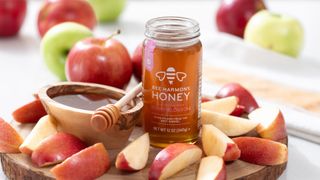
FREQUENTLY ASKED QUESTIONS
IS YOUR HONEY RAW?
Bee Harmony Honey is raw honey that is gently warmed and strained (not filtered) to retain natural enzymes and pollen.
IS YOUR HONEY PASTEURIZED?
Bee Harmony Honey is gently warmed to liquefy the honey crystals during packaging — the temperature is about what the hive would normally get to on a hot summer day. This minimal warming process is not technically considered pasteurization since honey is naturally bacteria-resistant.
DO YOU ADD ANYTHING TO YOUR HONEY?
Bee Harmony Honey is 100% honey, made by honeybees from the flower nectar they gather. There are no added ingredients — each variety showcases the unique flavor that comes naturally from the floral source. The color, flavor and aroma can vary from batch to batch, depending on what floral sources the bees visited and in what environmental conditions.
Our selection does include three infused honeys, featuring ingredients that have been thoughtfully selected to complement each varietal for a special flavor experience.
HOW DO YOU SOURCE YOUR HONEY?
We have our own apiaries, and we also source honey from trusted beekeepers who undergo a strict approval and certification process.
IS YOUR HONEY ORGANIC?
We offer four varieties of organic Bee Harmony Honey: Brazilian Raw Organic, Brazilian Rainforest Raw Organic, Eucalyptus Raw Organic and Eucalyptus Raw Organic Creamed.
DOES YOUR HONEY CONTAIN ANY ALLERGENS?
Bee Harmony Honey does not contain wheat, crustacea, eggs, fish, peanuts, milk, tree nuts, soybeans, monosodium glutamate (MSG), sulfites, lactose or Yellow 5 (tartrazine). Bee Harmony Honey facilities do not process or store anything containing gluten.
IS YOUR HONEY KOSHER?
Bee Harmony Honey is Orthodox Union Kosher for Passover Certified.
Our jasmine infused honey, lavender infused honey and turmeric infused honey are certified Kosher by EarthKosher.
WHAT KIND OF TESTING DOES YOUR HONEY UNDERGO?
Our honey is tested for purity, safety and quality measures, which is key to delivering a 100% safe and delicious honey.
• Purity is tested to confirm the absence of sugar adulterants such as sugar syrups, High Fructose Corn Syrup (HFCS) or cane sugar.
• Safety measures include lead, pesticide and antibiotic residue testing.
• Quality assurance procedures include color, flavor and moisture testing.
Our honey is also packed under Safe Quality Foods (SQF) certification, the only system to ensure both food safety and quality criteria are met.
WHAT IS HONEY CRYSTALLIZATION?
Most honey, especially raw honey, will eventually crystallize or solidify. This natural process causes honey to become thick and granular, but it is still perfectly edible and enjoyable in this form. Exposure to lower temperatures can also speed up the rate of honey crystallization.
To reliquefy crystallized honey, pour a couple inches of water into a pot and heat on the stove until it's very warm (but not boiling). Place the jar of honey in the heated water, keeping an eye on it until the crystals dissolve, then carefully remove the jar.
HOW DO I STORE HONEY?
Store honey at room temperature at all times; it doesn’t need to be refrigerated. If you choose to keep it in the fridge, it will crystallize sooner due to the cold temperature. Keep out of direct sunlight to prevent premature darkening. Always make sure the lid is tightly sealed.
WHAT IS THE SHELF LIFE OF HONEY?
One of the great things about honey is that because of its natural properties, it does not spoil or expire. However, to avoid crystallization (solidifying of honey), it's best when consumed before the ‘Best by’ date on the container. Honey may also undergo other normal changes over time, such as darkening in color.
HOW IS HONEY MEASURED?
The label located on the container of honey indicates the net weight of the product. Due to its viscous nature, all honey is required to be measured in weight and not in fluid ounces.
HOW DO I SUBSTITUTE HONEY FOR SUGAR?
Honey is actually 25-50% sweeter than cane sugar, so follow these guidelines when substituting it for sugar in your baked goods recipes:
• Replace each cup of sugar with 2/3 to 3/4 cup of honey.
• For each cup of honey, reduce other liquid the recipe calls for by 1/4 cup.
• Add 1/4 tsp. of baking soda per cup of honey used.
• Reduce the oven temperature by 25 degrees to prevent overbrowning.